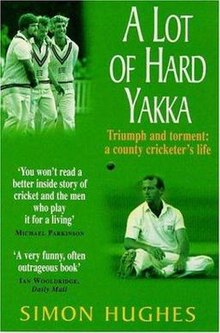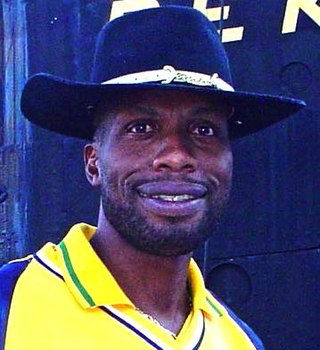
Sir Curtly Elconn Lynwall Ambrose KCN is an Antiguan former cricketer who played 98 Test matches for the West Indies. Widely acknowledged as one of the greatest fast bowlers of all time, he took 405 Test wickets at an average of 20.99 and topped the ICC Player Rankings for much of his career to be rated the best bowler in the world. His great height—he is 6 feet 7 inches (2.01 m) tall—allowed him to make the ball bounce unusually high after he delivered it; allied to his pace and accuracy, it made him a very difficult bowler for batsmen to face. A man of few words during his career, he was notoriously reluctant to speak to journalists. He was chosen as one of the Wisden Cricketers of the Year in 1992; after he retired he was entered into the International Cricket Council Hall of Fame and selected as one of West Indies all-time XI by a panel of experts.

James Charles Laker was an English professional cricketer who played for Surrey County Cricket Club from 1946 to 1959 and represented England in 46 Test matches. He was born in Shipley, West Riding of Yorkshire, and died in Wimbledon, London.

Kimberley John Hughes is a former cricketer who played for Western Australia, Natal and Australia. He captained Australia in 28 Test matches between 1979 and 1984 before captaining a rebel Australian team in a tour of South Africa, a country which at the time was subject to a sporting boycott opposing apartheid.

Sir Leonard Hutton was an English cricketer. He played as an opening batsman for Yorkshire County Cricket Club from 1934 to 1955 and for England in 79 Test matches between 1937 and 1955. Wisden Cricketers' Almanack described him as "one of the greatest batsmen in the history of cricket". He set a record in 1938 for the highest individual innings in a Test match in only his sixth Test appearance, scoring 364 runs against Australia, a milestone that stood for nearly 20 years. Following the Second World War, he was the mainstay of England's batting. In 1952, he became the first professional cricketer of the 20th century to captain England in Tests; under his captaincy England won the Ashes the following year for the first time in 19 years.
The Wisden Cricketers of the Year are cricketers selected for the honour by the annual publication Wisden Cricketers' Almanack, based "primarily for their influence on the previous English season". The award began in 1889 with the naming of "Six Great Bowlers of the Year", and continued with the naming of "Nine Great Batsmen of the Year" in 1890 and "6 Great Wicket-Keepers" in 1891.

Hedley Verity was a professional cricketer who played for Yorkshire and England between 1930 and 1939. A slow left-arm orthodox bowler, he took 1,956 wickets in first-class cricket at an average of 14.90 and 144 wickets in 40 Tests at an average of 24.37.
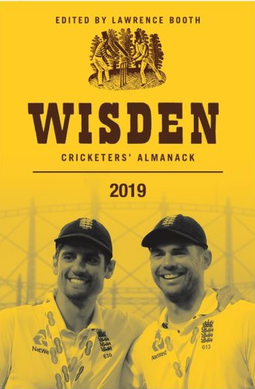
Wisden Cricketers' Almanack, or simply Wisden, colloquially the Bible of Cricket, is a cricket reference book published annually in the United Kingdom. The description "Bible of cricket" has been applied to Wisden since the early 1900s.

Clement "Clem" Hill was an Australian cricketer who played 49 Test matches as a specialist batsman between 1896 and 1912. He captained the Australian team in ten Tests, winning five and losing five. A prolific run scorer, Hill scored 3,412 runs in Test cricket—a world record at the time of his retirement—at an average of 39.21 per innings, including seven centuries. In 1902, Hill was the first batsman to make 1,000 Test runs in a calendar year, a feat that would not be repeated for 45 years. His innings of 365*, scored against New South Wales for South Australia in 1900–01, was a Sheffield Shield record for 27 years. The South Australian Cricket Association named a grandstand at the Adelaide Oval in his honour in 2003 and he was inducted into the Australian Cricket Hall of Fame in 2005. Hill is regarded as one of the best batsman of his era.
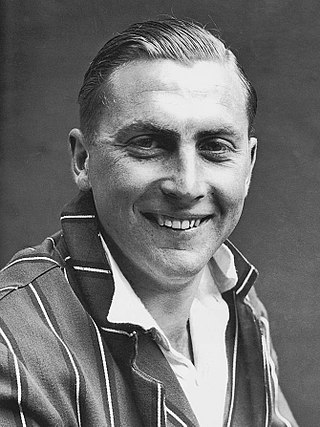
Harold Gimblett was a cricketer who played for Somerset and England. He was known for his fast scoring as an opening batsman and for the much-repeated story of his debut. In a book first published in 1982, the cricket writer and Somerset historian David Foot wrote: "Harold Gimblett is the greatest batsman Somerset has ever produced." Gimblett is a member of the Gimblett family, an Anglo-French family who arrived in Britain in the early 18th century from Metz. The family spread out over Britain, with branches located in Somerset, Scotland, and South Wales. There are variations of the spelling of the name, including Gimlet, Gimlette, and Gimblette.

Frank Edward Woolley was an English professional cricketer who played for Kent County Cricket Club between 1906 and 1938 and for the England cricket team. A genuine all-rounder, Woolley was a left-handed batsman and a left-arm bowler. He was an outstanding fielder close to the wicket and is the only non wicket-keeper to have held over 1,000 catches in a first-class career, whilst his total number of runs scored is the second highest of all time and his total number of wickets taken the 27th highest.
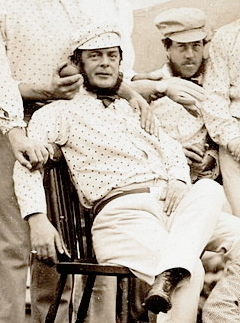
John Wisden was an English cricketer who played 187 first-class cricket matches for three English county cricket teams, Kent, Middlesex and Sussex. He is now best known for launching the eponymous Wisden Cricketers' Almanack in 1864, the year after he retired from first-class cricket.
Edward Thomas Smith is an English author and journalist, former professional cricketer, and cricket commentator. He played first-class cricket for Kent, Middlesex and England, he currently works in association football in the Sporting Intelligence department at Derby County.
This is a bibliography of literary and historical works about cricket. The list is sorted by author's name. It is inevitably highly selective. The 1984 edition of E. W. Padwick's A Bibliography of Cricket had more than 10,000 entries.
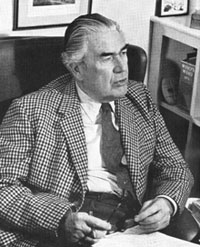
Ernest William "Jim" Swanton was an English journalist and author, chiefly known for being a cricket writer and commentator under his initials, E. W. Swanton. He worked as a sports journalist for The Daily Telegraph and as a broadcaster for BBC Radio for 30 years. He was a regular commentator on Test Match Special, easily recognised by his distinctive "fruity" voice. After "retiring" in the 1970s, he continued to write occasional articles and columns until his death in 2000.
Simon Peter Hughes, also known as The Analyst, is an English cricketer and journalist.
Roly Jenkins was an English cricketer from the period immediately after World War II, almost exclusively for Worcestershire County Cricket Club as a leg spinner. Along with Doug Wright and Eric Hollies, Jenkins was a star of the last generation of English leg-spinners before a more defensive mindset, followed by failed rule changes like a standard 75 yards (68.6 m) boundary and then the advent of one-day cricket, all but killed off home grown wrist spinners.
Stephen Chalke is an English author and publisher, particularly of books on cricket and cricketers.
Dicky Jamshed Sohrab Rutnagur was an Indian sports journalist. He was cricket correspondent for the Hindustan Times from 1958 to 1966, when he became a freelance based in the UK. He covered cricket, squash and badminton for The Daily Telegraph from 1966 to 2005.

Victor Thomas Trumper was an Australian cricketer known as the most stylish and versatile batsman of the Golden Age of cricket, capable of playing match-winning innings on wet wickets his contemporaries found unplayable. English cricket captain Archie MacLaren said of him, "Compared to Victor I was a cab-horse to a Derby winner". Trumper was also a key figure in the foundation of rugby league in Australia. His photograph taken by George Beldam in 1905 is often considered to be the greatest cricketing photograph ever taken.
